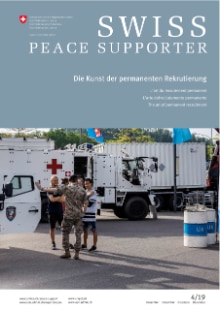- Home
- FDFA
- Publications
- All publications
Search and filter
Publications: 81
-

Swiss Peace Supporter 4/2019
This latest edition focuses on recruiting experts for field operations. Police deployments on peacebuilding missions are the subject of one article, illustrated by Switzerland's engagement in Mali. A further article looks at mediation within the OSCE. Another recounts a day in the life of a young UN volunteer in Mexico.
-

30 years of Swiss participation in election observations: Review and outlook
This anniversary publication places Switzerland's election observation operations in their historical context, explains the comprehensive approach behind election observation and electoral assistance from different perspectives, and sets out some of the new challenges we face in the digital age. The analysis and statistics are complemented by field reports from 30 years of election observation.
-

Swiss Peace Supporter 3/2019
This issue assesses the progress achieved and new challenges faced in implementing the anti-personnel mine ban convention. The 4th Review Conference, to be held in Oslo in November 2019, will provide an opportunity to renew the treaty's commitment to a mine-free world in response to some recent, worrying statistics. In addition, we look back on the 30th anniversary of Switzerland's participation in international election observation missions.
-

Swiss Peace Supporter 2/2019
On 23 June 1999, the Federal Council made the decision to participate in the UN military peacekeeping mission in Kosovo. Since then, 620 women and 7,880 men have been involved in peacekeeping operations with the ‘Swiss Company’, abbreviated to SWISSCOY. This latest edition of ‘Swiss Peace Supporter’ tracks the progress of the peacekeeping mission. It also includes eye-witness reports of election monitoring in Ukraine and Nigeria.
-

Swiss Peace Supporter 1/2019
Switzerland's successful history of international peace support operations began 30 years ago with a contingent dispatched to the United Nations mission in Namibia. This edition of Swiss Peace Supporter looks back on the contributions made by Switzerland to peace support operations since 1989. A captivating account by Adolf Ogi and reports from the field will give you an insight into Switzerland's engagement in the UN.
-

Politorbis Nr. 67: Non-Communicable Diseases in Emergencies: where do we stand? where do we go?
This magazine on Swiss foreign policy publishes articles written by experts. It appears several times a year. The articles are published usually in the language in which they were written. The contents do not necessarily reflect the views of the FDFA.
-

Swiss Peace Supporter 4/2018
Situation monitoring is essential in peace support, which relies on accurate, unbiased information –information gathered by independent observers, who are the focus of this issue. How do you become an UN military observer? What does an election observer do? Why is the OSCE monitoring the issue of language in Odessa in Ukraine?
-

Women, peace and security
Switzerland advocates for women to play an active role in conflict prevention and peace processes, in reconstruction efforts and in post-conflict reconciliation. At the same time, women should be better protected – especially from sexual violence. Switzerland reaffirms this commitment in its national action plan.
-

Swiss Peace Supporter 3/2018
“Capacity development – turning knowledge into practice” is a multifaceted concept and a key component of international cooperation. How can people be empowered to act? How can police capacities be strengthened in crisis-stricken countries such as Mali? What role do international organisations play in this? Apart from the focus topic, the 03/18 edition also includes articles from Ukraine and Colombia.
-

FDFA Action Plan against Torture
The fight against torture and ill-treatment has long been a Swiss foreign policy priority. The action plan maps out how Switzerland intends to uphold the absolute and universal ban on torture and ill-treatment, as well as the steps it will take to ensure its effective implementation.
-

Swiss Peace Supporter 2/2018
The latest edition of SPS focuses on 'Kosovo, a country in transition', with articles on SWISSCOY's move from a field camp in Prizren to Camp Novo Selo, dealing with the past and this young state's long path to democratization. In addition to the focus theme, this edition also includes current reports from Colombia, Western Sahara and the Central African Republic.
-

The ABC of International Humanitarian Law
The ABCs of International Humanitarian Law is essentially a glossary of terms explaining the key concepts of international humanitarian law, which is also known as the law of armed conflict. The brochure offers, beside the glossary, a short introduction on the development and area of application of this special field of international law.
Last update 26.01.2022
